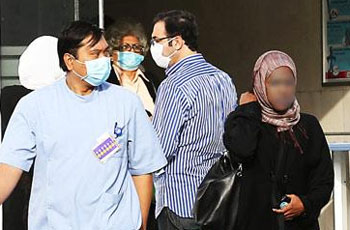 Riyadh/Jeddah, May 3: Seven fresh cases of coronavirus (MERS-CoV) were reported on Friday bringing the total number of infected cases in the Kingdom to 378 including 107 deaths since September 2012.
Riyadh/Jeddah, May 3: Seven fresh cases of coronavirus (MERS-CoV) were reported on Friday bringing the total number of infected cases in the Kingdom to 378 including 107 deaths since September 2012.
No fatalities due to the virus have been reported in any part of the Kingdom on Friday, said a Health Ministry official.
Acting Health Minister Adel Fakeih, meanwhile, said his ministry was currently focusing on a two-pronged approach to prevent and treat coronavirus (MERS-CoV) and to offer the best health care services to the people in the Kingdom.
He was addressing the directors of the 20 health regions and other concerned officials on ways to combat the disease.
Members of the National Scientific Committee for the Prevention of Infectious Diseases, officials from the ministries of interior, higher education, municipal affairs, National Guard, defense and private health sector executives attended the meeting.
According to the ministry official, the seven new cases reported during the past 24 hours included four in Riyadh and three in Jeddah.
He said four of them are stable, while two were in critical condition and undergoing treatment in the Intensive Care Unit (ICU) while the seventh patient was still under observation.
In Riyadh, three women aged 31, 28 and 50 have been affected with the disease and the fourth is a 28-year-old man who contracted the disease from an infected patient and is currently being treated at a private hospital where his condition is reported to be stable.
In Jeddah, two women of 38 and 28 years of age were reported to be infected with the virus and their condition is reported to be stable.
A 60-year-old man who is currently under treatment at a private hospital is reported to be critically ill at the Intensive Care Unit of the hospital in Jeddah.
At Wednesday’s meeting, Fakeih urged his officials to make more field visits to ensure proper health care during this period of crisis.
The minister thanked Custodian of the Two Holy Mosques King Abdullah for his concern toward offering the best health care services to the people in the Kingdom.
Spelling out the noble practices in health services, Fakeih said the officials should pay attention to the values of sincerity, honesty, and perseverance; perfection and transparency, and provide services with a sense of dedication, kindness and love.
He also urged officials to work as a team and ensure proper coordination with the concerned officials to give the best health care to the patients.
Fakeih’s new directives came as Egypt’s Health Ministry issued a warning to children, elderly people and anyone suffering from chronic heart and chest diseases against traveling to Saudi Arabia.
The first case of the disease in Egypt was reported on Thursday, in a 27-year-old man who lives in Saudi Arabia but returned ill to Egypt last week after having been in contact with an uncle in the Kingdom who died of MERS.
In a statement, cited by Reuters, Egypt’s health ministry said that anyone under the age of 15 or older than 65, as well as pregnant women and people suffering from chronic heart and chest diseases, should postpone pilgrimages to Saudi Arabia.
It further confirmed that no further MERS cases had been reported in Egypt.
The man, who contracted the virus is in stable condition, in a hospital in Cairo. Mohammad Al-Balawi, director of the information department in the Saudi embassy in Jordan, confirmed that a Saudi citizen who came to Jordan for medical treatment is inflicted with the corona virus.
He said the embassy received a call a few days ago about the presence of a Saudi patient inflicted with MERS in Al-Zaytoun hospital in Zerqa, north of Jordan.
As soon as the embassy received the call it called a number of well known hospitals in Jordan to explore the possibility of moving the patient to one of them.
These hospitals refrained from taking the patient because they have no vacant isolation rooms, said Al-Balawi said.
He said the embassy called the Jordanian Ministry of Health, which expressed its willingness to cooperate with the embassy and treat the patient in Prince Hamza hospital, which is equipped to receive such cases.






.jpg)
.jpg)
Comments
Add new comment